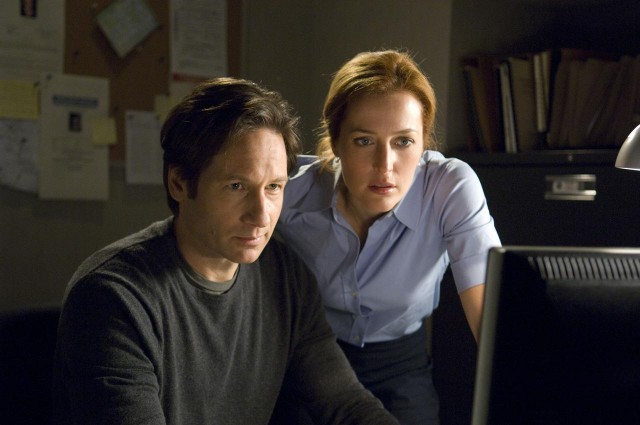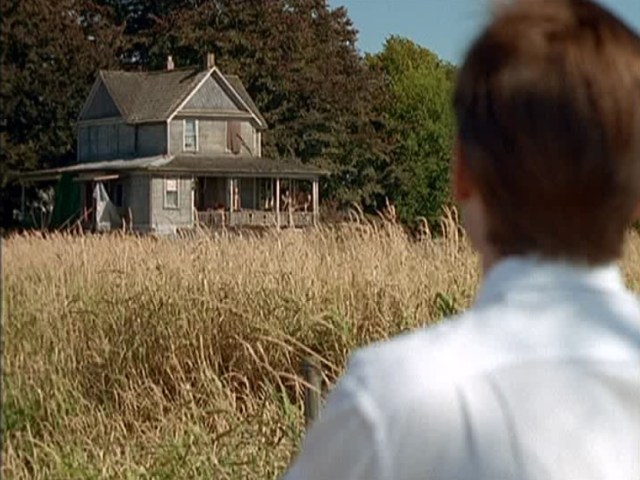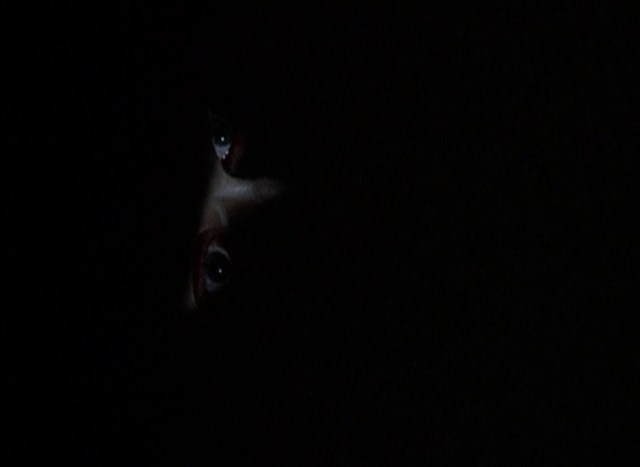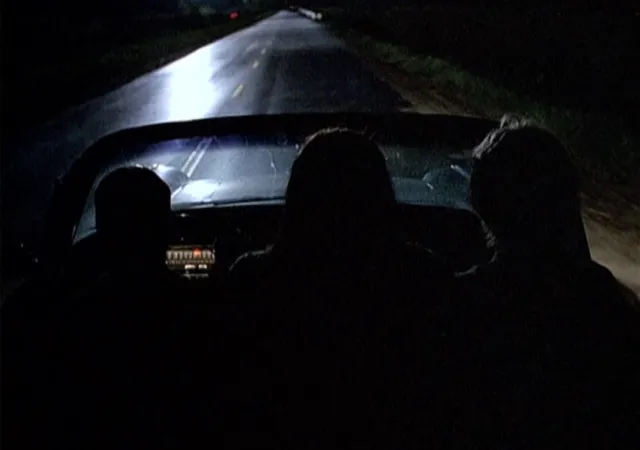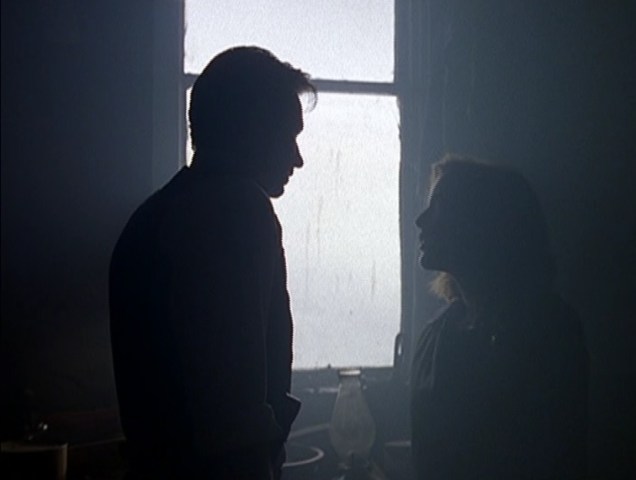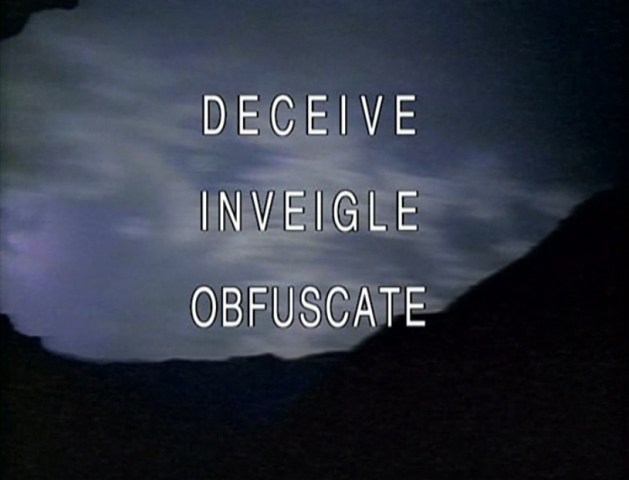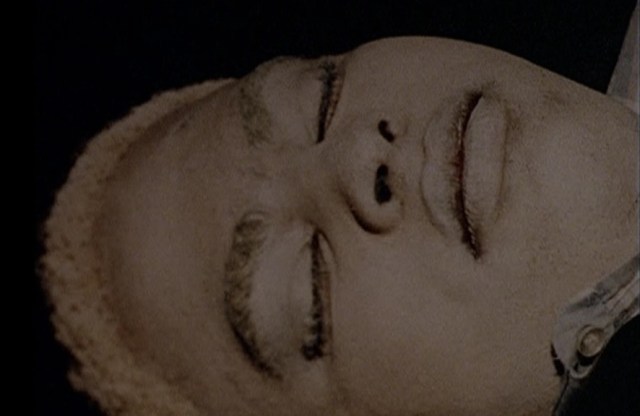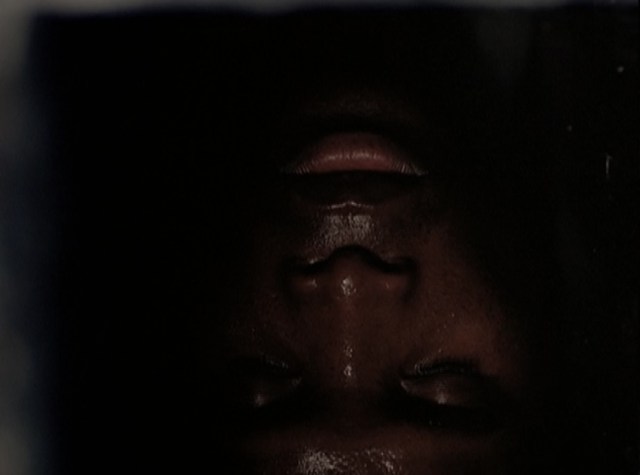The X-Files Newbie Recap: “Home” & “Teliko”
Deceive. Inveigle. Obfuscate.
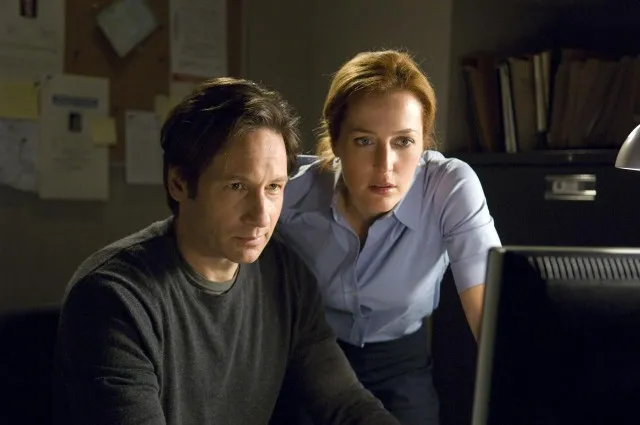
If I told you all the amount of bullcrap 2016 dumped on me in only its first week, you wouldn’t believe me. Suffice to say I feel like I’ve had a migraine for a week, so last week’s recap was postponed. Not that you were in a hurry to get to “Home” anyway, right?
[clutches tea and kitten.gifs]
Home
The notorious, infamous, spoken-of-in-hushed-tones episode that regularly appears in lists of TV’s most disturbing episodes, which everyone immediately warned me about when I began this show. Honestly, I was kind of looking forward to this. I’ve never let myself read any of the X-Files entries on the aforementioned lists to avoid spoilers, and I was wondering what sets this episode apart in a show that’s occasionally unnerving but rarely outright disturbing. Turns out, it takes the human evils that inform the more procedural episodes, marries that to the recurrent thread of maligned outsiders, and sets the whole thing in the American heartland, in a place meant to evoke security, strength, and comfort—home. Looked at in that way, this is genuinely about as creepy as a show can get.
Mulder and Scully join an investigation into the discovery of an infant’s body in Pennsylvania. The body is unearthed by a group of children playing baseball, just outside the fences of a large, creepy old house. The infant had been buried alive in the opening scenes by a group of deformed men who wailed and lamented as the grave was filled in.
The local sheriff, Andy Taylor, comes to help out. He looks deeply perturbed at what’s happened (in fairness, who wouldn’t be?) and makes reference to the “sick things” that happen in the outside world suddenly arising in his “home town.” (The episode makes repeated references to “home” and interpretations of same, which I’ll come back to later.) When Mulder asks about the house, Taylor tells them it belongs to the Peacock family. Saying, “I guess you could call them human,” he reveals the parents were in a bad car wreck several years ago, and it was presumed they died. He doesn’t know for certain though, because their three sons came and took the bodies away, and no one has seen them in ten years. The house was built during the Civil War and has no electricity or running water. The family grow their own food and “breed their own stock,” a turn of phrase exactly as loaded as it sounds.
The town is too small for a lab or a morgue so Scully and Mulder examine the infant’s body in what’s effectively a broom closet. Scully gasps when she sees it, saying it looks to be afflicted with every rare birth defect known to man. Noting the presence of soil in its windpipe, she deduces it was smothered.
The two of them go outside and discuss the case briefly. Scully wonders about the mother and what condition she’d be in after seeing this happen to her child. She stops herself and wonders aloud if she’s projecting what she would feel in the circumstances. Both she and Mulder seem quick to point out their families have no history of birth defects. Scully says the deformities could stem from years of genetic mutations, and wonders if—given the sheriff said the Peacocks were all boys—a woman was made to give birth against her will. Mulder notes kidnapping is a federal matter, while the case might initially appear not to fall within the FBI’s jurisdiction.
They head to the house to take a look around. There’s blood on the ground and a footprint that matches one lifted from the grave. The house seems deserted, so they decide to do some cross-referencing with the missing persons’ database. As they leave, the camera closes in on a pair of eyes hidden behind a wall, and we hear raspy breathing.
At his home that night, Sheriff Taylor checks his gun is fully loaded. He sits on the porch looking out into the darkness and, when his wife comes to get him, says he’s “taking a look around before everything changes.” Across town, Mulder shoves a chair against his motel room door when he realizes there’s no lock. A cadillac comes down the street in the darkness, blaring a discomfitingly upbeat song. It stops outside the sheriff’s house. Taylor tells his wife to hide and gets a gun and a baseball bat. The men break in and beat him and his wife to death before jumping back in the car and heading off.
Deputy Sheriff Paster contacts Mulder and Scully the next day. He discovered Taylor and his wife’s bodies when he came round with a package from the Federal crime lab. Mulder, looking at the bodies, remarks “they really went caveman on ’em.” The package is the DNA report on the dead infant. Scully looks it over and says there must be a mistake; the genetic information is too abnormal. Mulder wonders if, given the likelihood of inbreeding in the family, some genetic mutation means each of the Peacock boys fathered the infant. Scully disputes this and points out this doesn’t explain the absence of a woman in the family.
They decide to go and speak to the Peacocks. Paster, feeling bold and vengeful after what happened, accompanies them with several guns. Meanwhile, in the Peacock house, we see the eyeballs again, rasping “I’m hungry” and then “I’m ready.” The boys take off their shirts and file out as the voice warns they have to be ready for what’s coming—that this is their home, and it will stay that way.
Mulder, Scully, and Paster split up once they arrive. Paster approaches the front of the house and walks right into a particularly hideous booby trap at the door. What looks like a hammer flies down and thumps him in the head, then the Peacock boys move in and finish him off. Watching from a distance, Mulder and Scully are … curiously calm. Mulder, who was watching a nature documentary about pack hunters the night before, talks about men regressing to a prehistoric state and attacking those they perceive as taking away their chance for reproduction. He and Scully release the Peacocks’ pigs from their pen, and as the brothers try to round up the animals, the two of them slip inside. They narrowly avoid another booby trap in the process, and I may have audibly screamed “JESUS CHRIST” in my kitchen as I watched.
Old photos on the wall reveal that the family are definitely deformed. Noticing tracks on the ground, they look under a bed and find a woman hiding. She starts screaming wildly as they pull her out, attempting to explain that they’re there to help. She doesn’t appear to have any limbs. Mulder tries to calm her, saying “we’ll get you home,” but Scully recognises her from the photos as the Peacocks’ mother and says “she already is home.” Mrs Peacock, for it is she, pulls herself back under the bed. Scully now theorises that the eldest Peacock boy is the brother AND father of the other two. Mulder suggests reasoning with the mother, in an attempt to appease the boys somehow. The boys, having rounded up the pigs, approach the house again.
Mulder waits in the kitchen for them while Scully tries to talk to Mrs Peacock. She says her husband was killed in the accident and her right arm was torn off. The boys brought her home and stitched her back together, as it were—”same as makin’ breakfast.” (Oh.) She says her sons are “good boys,” and when Scully says they’ve murdered three people, replies, “I can tell you have no children.” She talks about the pride and love that comes from knowing your boy will do anything for his mother.
The boys come back inside and there’s a scuffle. One of them overpowers Mulder, despite being shot several times. Shouting that she has the mother, Scully manages to kill one in his own booby trap. Bullets finally another one down, but the mother and third brother are gone.
They call it in and put out an APB on the mother and other son. Mulder says he thinks “time already caught them.” The two remaining Peacocks are then shown in their car on a dark roadside. The mother talks about starting over, making a new family and a new home. The son places her in the boot of the car and they drive off, as the same infernally upbeat song plays from the radio.
Get yourself a stiff drink, then we’ll chat.
First things first: this episode is *fascinating.* Creepy? Yes. Disturbing? Yes. Graphic and probably pushing the boundaries of television? Yes, but a genuinely thought-provoking character study. I’ve done some reading and discovered the writers, Morgan and Wong, wanted to mark their return to the show with something particularly impactful. The producers thought it went too far, one crew member described it as “awful, even for us”, and the original audio featured the baby screaming as it was buried alive. Oh, and that hideous song is a cover of Johnny Mathis’ “Wonderful! Wonderful!” which I never ever want to hear again.
Let’s unpack all this. Firstly, the recurrent theme of home. It’s the episode title, and the first one as far as I can tell where so much emphasis is placed on it in the dialogue. The sheriff talks about his “home” town and it being a haven from the horrors of the outside world, until now. When they first arrive, Mulder says it’s the kind of town he could picture making a home in. The boys brought their injured mother and dead father home, instead of to a hospital. Mrs Peacock urges her boys to protect their family home when the FBI roll up. Mulder promises her they’ll get her home, before they realise who she is. Her final words are about setting up a home somewhere else. I find it interesting to correlate this to the depiction of the house, in a wide open field right next to a (makeshift) baseball pitch. This kind of image is often held up as idyllic—a representation of the American dream of building a place of safety and security in which to raise a family. It might be too obvious to suggest the episode undermines that image, evoking the hidden horrors behind trusted institutions, but there is the sense that this isolated structure represents a black mark in an otherwise scenic township. Yet, for the Peacock family themselves, this has been their only sanctity, and the place to which they retreated with their loved ones for safety.
The Peacocks themselves represent something of a moral conundrum. They reminded me instantly of the deformed cannibals in The Hills Have Eyes, yet there’s a strangely human aspect to their behaviour. Yes, the family have deformities—they’re inbred, abused and abusive, violent and dangerous. Their actions are shocking and disturbing in the most horrifying way. But I find it fascinating that they emerge from a house literally draped in shadows, like creatures borne of a nightmare. The house’s innards are exactly as terrifying as the town denizens suspect, and yet to them it’s home, so much so that they’ve rigged it with booby traps to punish anyone who tries to shed light on it. As twisted and aggressive as they’re depicted as being, I find it hard to condemn them entirely. The prevailing sentiment is pity—that their world has become so insular and unnatural, and their isolation coupled with an uncaring (and unwilling to care) society has shut them off to what goodness there is in the world. It’s ironic to think that Taylor sees his town as an escape from the amoral outside world, yet the hideous goings-on in the Peacock house have existed right within his town since the Civil War. In a way, although the Peacocks are hardly what you’d call a model family, there is a sense of goodness and humanity in their devotion to each other. The house is the only home they have, and they’ve cared for and kept it and its occupants in their own (admittedly gruesome) way for generations. Even the killing of the infant, probably the most damning and unforgivable deed imaginable, is to them humane given its condition.
Mulder’s remark that they were “caught by time” struck me. The town’s treatment of the Peacocks as outsiders is reminiscent of a time when deformity itself was considered a sin, and the episode makes reference to other characteristics that have often been stigmatised by society. At one stage, Scully points out that whoever dug the infant’s grave was left-handed. Left-handedness was considered abnormal in generations past, and bias still persists in many parts of the world (not to mention the way many everyday household tools are designed for right-handed users). Scully also says that if Mulder had to give up his cellphone, he’d lapse into a “catatonic schizophrenia”—mental illness being another condition for which sufferers are often demonised.
The entire episode is shot like a horror movie. This isn’t necessarily atypical of the show, but there’s an eerie sense of seclusion throughout the whole thing. Mulder and Scully make barely any reference to the wider FBI (bar a discussion on jurisdiction) and spend most of the episode in the same place. Results from the FBI lab are even delivered to them by a local. The camera holds on several shots designed to evoke suspense—a child rubbing his hands in soil while playing baseball, immediately preceding the discovery of the infant’s body, and the close-up of the disembodied eyes in the Peacock house. The house itself is dark and forbidding, and the family cruise around in darkness in a Cadillac—a good old slice of Americana, here being used in service of unspeakable things. (Also on that note, they find a newspaper announcing the death of Elvis Presley in the house.) The killing of the sheriff, and his remarks about the outside world creeping into his home town, evoke a sense of grim inevitability—that burying these terrible things doesn’t fix anything, and the proverbial skeletons in the closet will always break out. The lighting is deliberately obscure, as if to reflect that. The episode feels more otherworldly and unnatural than any of the paranormal ones, and is infused with an added sense of disbelief which makes the whole thing seem like a horrible dream. I can easily imagine Mulder and Scully going back to DC and never speaking about it again, consigning the whole thing to memory and deciding it was something they dreamed up.
On a final note, there is another recurring theme—motherhood. As represented by Mrs Peacock, and even Scully reflecting on what she’d feel were she the parent of a deformed child. Motherhood as a concept is intricately connected with the idea of home, in that mothers represent safety, comfort, and protection for children. Babies scream for their mother long before they have a conscious understanding of who or what that is. To borrow a phrase from Thackery (by way of The Crow), mother is the name for God on the lips and hearts of all children. In that sense of course, having the first scene of the episode depict the death of an ailing infant at the hands of its family is all the more chilling, suggesting as it does that the notion of protecting one’s child can sometimes take a feral form.
I could muse on this one for weeks, but given the pretty unpleasant subject matter and the fact several commenters have already said they couldn’t sit through that episode again (I feel you), maybe we should move on before this gets *too* dark. Just two final notes:
- Mrs Peacock’s refuge under the bed was partially inspired by an incident Charlie Chaplain detailed in his autobiography.
- The garden of the Peacock house is strewn with random patches of weeds. Am I to assume these mark other shallow graves…?
Meep.
Teliko
Dr. Dana pulls on her scrubs and surgical mask and makes everything better by medically sleuthing her way to the truth. I know I’ve noted this before, but I *love* Dr. Dana. I use this term to distinguish between her MD side and her Agent Scully side, but it feels oddly fitting because there’s something about Dana the doctor which seems so much more natural or authentic. Not to in any way diminish her abilities as an agent, because she’s outstanding, but I think Scully herself enjoys the certainty of medical science and being able to use established studies and theories to break down a case. Not least as it gives her a periodic break from rolling her eyes at Mulder’s conspiracy theories and little green men.
To that end, she makes several remarks in this episode which I find pleasingly indicative of her character. When she identifies a potential link between a gland in the body and a condition afflicting the victims in the case, she points out that it’s an effect, not a cause. When another doctor says the perpetrator in the case is asymptomatic and they should pursue a different line of enquiry, she pushes for more tests so they can be as thorough as possible. When Mulder insists on there being some murderous motivation at work, she reminds him that the motive of any pathogen is to reproduce itself, and her job is to find out how and why that is. I think she finds a kind of freedom in going back to her medical roots, one which allows her a more familiar and satisfying means of understanding the cases they handle. And, given how much her life has been uprooted since she got involved with Mulder and the X-Files, I’m kinda glad she has it.
“Teliko” depicts a series of murder-kidnappings in which the victims—all young African-American men—are found with the pigment drained completely from their skin. The first victim is killed on a transatlantic flight from Burkina Faso and discovered in the bathroom, but the case only comes across the FBI’s desk after a doctor from the CDC asks Scully to get involved. The depigmentation of the bodies has the CDC wondering if perhaps a pathogen, as opposed to a killer, is at work. They need someone with a medical background to investigate and make a quick analysis. Boys, you’ve come to the right place. I’d watch a whole medical drama about Dr. Dana tbh.
Mulder arrives mid-autopsy, quipping “I heard you were down here slicing and dicing, who’s the lucky stiff?” Bless this man’s ability to be so endearingly inappropriate all of the time. Scully brings him up to date and says she hasn’t yet made a diagnosis, but the fact there are no signs of trauma or defence wounds would seem to suggest there was no foul play. Mulder wonders if this is all a PR exercise, because young black men are dying and the police don’t have a suspect. I would remark that his pathological paranoia is out of control but we all know how grimly true to life that notion can be. Leaving Scully to continue slicing and dicing, he takes the forensic evidence and goes off to do his own investigating.
His first stop is Pendrell’s office. Pendrell is honestly a strong contender for my favourite minor character in a telly show ever. He looks crestfallen when Mulder says Scully can’t join them cos she’s on a date, and only partially brightens when Mulder clarifies it’s with an dead body. Our adorable boffin techie fave has found a seed among the evidence and traced it to a rare African passionflower. Mulder gets on a plane to NYC and meets Ms. Covarrubias from the UN. She’s standoffish at first, but later opens up a line to the Burkina Faso embassy. Mulder also gets a copy of a report on the first victim, the man who died on the plane. Apparently his body was returned to the embassy, per their demand, without an autopsy ever being performed.
In the meantime, another young man, Alfred, goes missing. He’s captured after being shot in the neck with some kind of thorn. The guy who takes him is called Samuel Aboah, a recent immigrant to the country looking to become a naturalised citizen. Mulder and Scully arrive on Aboah’s doorstep a few days later after chatting to a social worker. Aboah bolts when he sees them and takes refuge in in some kind of air vent. “Squeeze” flashbacks, anyone?
Aboah is brought in for testing but doctors believe him to be asymptomatic. Scully requests that more tests be carried out. The autopsy she carried out earlier revealed a necrotised pituitary gland, which might explain the absence of melanin and hence the depigmentation of the skin. Mulder pays a visit to a diplomat at the Burkina Faso embassy. The diplomat, Diabra, tells him about folk tales of spirits called the Teliko. In the tales, these spirits hide in dark places by day and come out at night to attack people. He doesn’t specify exactly how they attack, but says he saw one as a child and that it killed his cousin.
Echoing Diabra’s words, Aboah manages to break out of hospital by hiding himself in the food cart. He finds the social worker, Marcus, who seems pleased he’s been released and offers him a lift home. Elsewhere, Scully’s tests reveal that Aboah has some kind of growth in his throat and, more staggeringly, he appears to have no pituitary gland. Mulder comes in midway through to alert her that Aboah’s gone.
The growth in his throat is some kind of dart gun that he’s using to fire thorns at people. It’s gross, so let’s not dwell on it. His attempt to bump off Marcus is interrupted when a policeman rambles by and spots them, so he scarpers into a nearby demolition site. Mulder and Scully arrive later. Asbestos fibres were found on one of the bodies, so Mulder wants to check the place out. In his usual ill-advised manner, he bombs right in to this condemned and presumably very dangerous building without calling it in or asking for back-up. Scully follows at a distance. Aboah hits Mulder with one of the thorns and he goes down, only just managing to call to Scully for help. She makes her way through the building—I love, by the way, how often they end up clambering through rickety, creaking, dirty old edifices in this show—and eventually finds him in an air vent. Aboah appears behind her but she shoots and manages to scare him off. She pulls Mulder, who’s conscious but seemingly paralysed, out of the vent and discovers the bodies of the other missing men. As she calls 911, Aboah creeps up behind her but Mulder manages to alert her and she shoots him.
Later, Scully writes up her report. Marcus is recovering (presumably Mulder is too, chortle) and Aboah has been charged with murder. However, it’s looking unlikely he’ll live to stand trial. She writes that she’s convinced only medical science can explain his condition and his place in the broader context of evolution. What science may never explain, however, is our fear of the “alien” among us, that which leads us to obscure, inveigle, and obfuscate, concealing the truth from others as well as ourselves.
And fin.
After my spiel on “Home”, I’ll do this one in bullet points:
- There’s an entertaining emphasis on the phrase “deceive, inveigle, obfuscate” throughout. Mulder and Scully each use it and it even replaces the “truth is out there” card on the opening credits. A nice wry nod to the underlying theme of the entire show and also a nice contrast with Scully’s adamant quest for medical truth. There are no mysteries in science, after all, just things you don’t understand yet.
- Scully saves Mulder’s ass. Again. This happens quite a lot and I find it amusing, not just because it flips the usual imperilled woman trope on its head (though Scully has been imperilled before), but because it’s actually perfectly in keeping with their characters. Mulder barges in first and asks questions later, Scully takes educated risks.
- I like to think Scully’s use of “alien” in her notes is deliberate. Sure, it’s a play on “illegal alien” but given the presence of genuine UFOs in the show it’s a nice touch. Fear of immigrants and societal outsiders seems doubly contemptible when you see how much no one in this show fears ACTUAL aliens.
- That said, the depiction of a man coming into the US from West Africa with a disease doesn’t seem particularly sensitive. Especially when you consider the panic over Ebola (which goes back decades), and the fact Ebola outbreaks tend to predominantly afflict countries in West Africa.
I could do another episode here, but there’s enough in “Home” for a recap in and of itself so I’ll leave it there for now. Thank you, as ever, for reading and see y’all next week! Stay spooky, friends.
Grace Duffy is a pop culture devotée and sometime film critic currently catching up on her classic sci-fi. You can read more on her Tumblr or catch her frequent TV liveblogs on Twitter.
—Please make note of The Mary Sue’s general comment policy.—
Do you follow The Mary Sue on Twitter, Facebook, Tumblr, Pinterest, & Google +
Have a tip we should know? [email protected]
